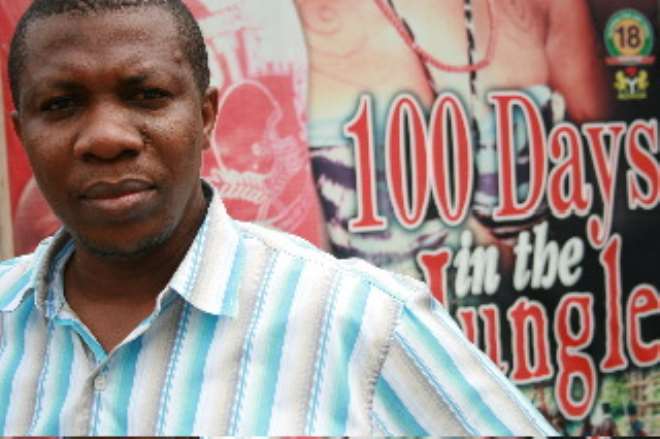I face pressures from female admirers– Chico Ejiro .
Chico Ejiro is an Agricultural Economist turned movie director cum producer. But his love for movies seems ingrained right from childhood when his mother used to take him and his elder brother, Zeb Ejiro, to the cinemas. He knew at the time that his love for the cinema would be long lasting. Over the years, Ejiro has emerged as one of the best directors and producers in the Nigerian movie industry, aptly tagged Nollywood by movie lovers. With over 100 movies to his credit, he has attracted the nickname, Mr. Prolific. In this interview with CHIOMA AGALI, he said his dream is to shoot a movie that would be recognised all over the world. Excerpts:
What are your personal and educational backgrounds?
I am Chico Ejiro. I am from Maziakpono in Isoko, Delta. I grew up in Ajegunle (a slum of Lagos then). But thank God today I live in Lekki Phase 1. I'm married to Joy Ejiro and we have three kids: two boys and a girl. I am a producer and a director. I have over 100 movies to my credit in Nollywood. I have been in the Nigerian movie industry for 25 years. I have two elder brothers in the industry. I started my school way back in Warri (before Bendel State, now Delta State). Along the line when I got to Primary 4, I was moved to Ilorin (Kwara State) where I finished my primary school. I continued my secondary school at Bishop Suleiman College in Ilorin. I did a two-year diploma course in Ife and later went to the University of Agriculture, Umudike in Umuahia, Abia State. When I finished from there, I worked with my elder brother, Zeb Ejiro, for seven years. I also worked with Opa Williams for another three years before I established my own label called Grand Touch Pictures.
How did your journey into the movie industry begin?
I give thanks to God and my elder brother, Zeb Ejiro, who gave me the opportunity, right from the days of Ripples, as far back in 1988. Then, I was still schooling at Ife. During the holidays, I used to come to assist them to shoot Ripples. So, I went from a production assistant to cameraman, to director. But from time, I have had the interest in movies. My mother used to take my elder brother, Zeb, and I to go and watch movies way back in Equatorial Guinea. So, from that background of the Nigeria Television Authority (NTA), Ripples and Zeb and other directors like Fred Amata, Andy Ameachi, to mention a few, over the years, helped out too. It was great working under those directors.
Was this what you have always wanted to do and if you were not into entertainment, what else would you have been doing?
I told you I studied agriculture in school. Along the line in life, one just discovered that one had interest in other spheres of life or professions. So, may be I would have been a full time farmer. I would have been somewhere in the farm planting cassava, tomato, rearing chicken, snail and pigs. But I have this passion for entertainment.
Since you have been a producer and a director, how has it been?
Fantastic. Whatever I am today, I give credit to God almighty, my brother, my mother, my wife and not forgetting my friends. I worked with people who have been very, very encouraging. People like Alex Usifo, Richard Mofe Damijo, Babara Soky, Liz Benson, Patience Ozokwor, Rita Dominic, Jim Iyke and so many other actors and actresses. My wife, Joy, has been behind me. She gives me the push. And the audience have been great to appreciate what we do.
What were the challenges you faced when you started and what are the challenges you are currently facing?
When I started, the first episode of Ripples I directed had Barbara Soky and Alex Usifo. Then, they were big stars. I was scared and nervous working with people who I have been seeing over the years on screen. They tried a lot to encourage me, not to be too nervous. But now, I am more relaxed because I have made a name through the help of God and people. These days, we are trying our best. But we still have problems in terms of professionalism in this business, technicallly due to the right equipment, even finance. So we are praying to God and hoping that with time we would get better. Hollywood was not built in a day. And Bollywood in India too. With time, our own Nollywood would get there. In Africa now, Nigeria movie is number one. They should give us time. The challenges we face in the industry is not far from piracy. A lot of film makers and even the musicians are not making their money because of piracy. The problem of marketing is also there. When you go to Alaba Suru, where they market the films, you will agree with me that they are not marketing the films well. In the last three years, people have seen that the Nigeria movie industry has improved. We are also trying to make sure we give the audience good stories.
As a producer, how do you get your inspiration?
I listen to people a lot. Most of the time I take a walk on the street for me to see what people go through in their daily life. I also watch movies. I like to make friends and I like to be with my friends. That way, I can learn more and get my inspiration from what we discuss.
What are the differences between the lives of producers and actors and actresses?
A producer or a director is the one that is running the show. The job of the actor or actress is to perform the show.
With over 100 movies to your credit, which movie is your most memorable?
I don't have any particular one. But I have a few I can count. Silent Night was one movie I loved because it was a very emotional story where a father had to sentence his own son to death by firing squad. There is another one entitled Festival of Fire. I won an award with that one in Geneva, Switzerland. I also like Full Moon. To make Full Moon, I had to travel to many parts of Nigeria. I went to Jos, I went to Abeokuta, I went to a cave in Onitsha, I went to Osogbo, I went to Sango Ota, I went to about six states of the federation to shoot just one movie. Outcast is another good one. There are so many that I can't mention now.
How rewarding is this business?
Up and down. But we thank God. I remember when I entered the industry newly, I was paid N200. I try to tell the young ones that are coming in now that entertainment is all about passion. Don't look at at the pay, look at what you have to offer the audience.
As a producer and director, how would you say the Nigerian movie industry has fared?
I will say we are down now and we are just trying to discover ourselves.
You do joint business with your wife. How do you cope?
My wife produces a lot of my movies. She has a beauty palour and most of the movies I produce she does all the costuming. Most of my movies like Day break, Outcast, she did the costuming. We work as a partner because I believe in united we stand. When husband and wife put their ideas together, they find it so easy to fly.
When the two of you are away for business, who takes care of the children?
I have a house help, younger ones, my mother-in-law and my mother. Once in a while, they come over for holiday. I just came back from London together with my wife. So when we are away, we make good provision for the children. We ask our mothers to take care of the children while we are away.
What attracted to your wife?
I loved her figure. But figure alone doesn't take you there. I love her understanding about life. She doesn't talk too much. Sometimes when I am about to produce a movie, I tell her and she will tell me the right thing to do. She is always there for me. I like her drive in life. For instance, there were moments when I felt like giving up. Like when I shot my most expensive movie, Full Moon, I spent N6 million to shoot the film. It was a big budget movie. When I released the movie into the market, it didn't sell the first week. So, I was scared. But my wife assured me to take things easy, that it would succeed. So, you need someone who would encourage you in such moments. Life is all about understanding. She has been very understanding and encouraging me. I don't know the right adjective to use to qualify her person. When one wants to marry, you marry who you love, who you can sit down and tell your problem, communicate with and understand one another. Tolerance should also be there to keep the marriage going because both parties are different people entirely. You must learn the words sorry and thank you. There are times you are right but you just say I am sorry for peace to reign. Marriage is an institution.
Where and how did you meet her?
I met her at the University of Lagos in 1994. I was directing a production for Opa williams and she was in the audience.
What has kept the marriage?
Understanding and tolerance.
How would you describe yourself?
I don't know how to do that by myself. But if I am forced to, I will say I am a very humble person and I take life as it comes.
If you can effect any change in the Nigerian movie industry, what will that be?
Distribution. How we distribute the movie so that piracy will not continue. I will use the method of demand and supply.
You are the owner of Grand Touch Pictures. What inspires your style?
I will say it is God.
Is it true that movie directors ask young girls to sleep with them to get good roles?
It is not true. Let me take you to sports. If you run 100 meters under 10 seconds, you will be chosen. If you are good at acting, you would get a role. Again, it is business. You have to be extremely good. If I have an audition here, you would have more than 1,000 people who would come for it.
Being a successful director, do you face pressures from female admirers?
I do. Sometimes they come and tell you to give them a role, I will give you anything. But that is not what life is all about. When a man mixes business with pleasure, he will fail totally. Business, always, comes first for me.
Years from now, where would you want to see yourself?
I pray that some day, I would shoot a movie that would have international recognition, a movie that would get me Oscar nomination, or Cannes nomination. That's my dream. Where my work would be recognised all over the world.
Have you ever gotten to a point in your career when you felt like giving up?
Yes. During the shooting of the movie, Slave. In Slave, a lot of things happened. It was a big budget movie I shot in Abakaliki. I spent N3 million to shoot it with Infinity Merchants. At the end of the day, one actor died on set. After shooting, the actor jumped into the river and couldn't come out again. From day one, I had problems with the family of the deceased. And also the film did not do well. I lost my total investment. But that is life for you.
What are the procedures of joining the movie industry?
Submit your pictures, come for auditions or you join the Actors Guild of Nigeria (AGN).
What puts you off in people?
Arrogance. And also people who talk too much that are not God fearing. I admire humility and I like to listen to people a lot.
What advice do you have for the upcoming ones that want to take after your path?
Entertainment job is all about patience. I just told you that I have spent 25 years in the industry. I studied agriculture and left my primary calling and settled for entertainment. You must learn how to stay focused and humble for you to work with people. You must be dedicated because you don't know where that job will take you to. Finally, you must believe in yourself that I can do it.
Latest News
-
 "If You're For Me, I Am For You" - Cubana Chief P
"If You're For Me, I Am For You" - Cubana Chief P -
 "3 Days To Go" - Femi Adebayo Urges Fans To Get S
"3 Days To Go" - Femi Adebayo Urges Fans To Get S -
 "Stop Asking Me Questions About Speed Darlington"
"Stop Asking Me Questions About Speed Darlington" -
 "Benue Is The Most Underdeveloped State I've Ever
"Benue Is The Most Underdeveloped State I've Ever -
 Stan Alieke Urges Young Professionals To Take Lin
Stan Alieke Urges Young Professionals To Take Lin -
 Chizzy Alichi Teases Fans With Baby Reveal, Promot
Chizzy Alichi Teases Fans With Baby Reveal, Promot -
 "I'm Not Wearing Makeup From July 4th Till Decemb
"I'm Not Wearing Makeup From July 4th Till Decemb -
 "Stop The Challenge Of Mocking Kids With Down Syn
"Stop The Challenge Of Mocking Kids With Down Syn -
 Regina Daniels Celebrates Sons As They Mark Birthd
Regina Daniels Celebrates Sons As They Mark Birthd -
 Speed Darlington Threatens To Sue NAPTIP For Defam
Speed Darlington Threatens To Sue NAPTIP For Defam














